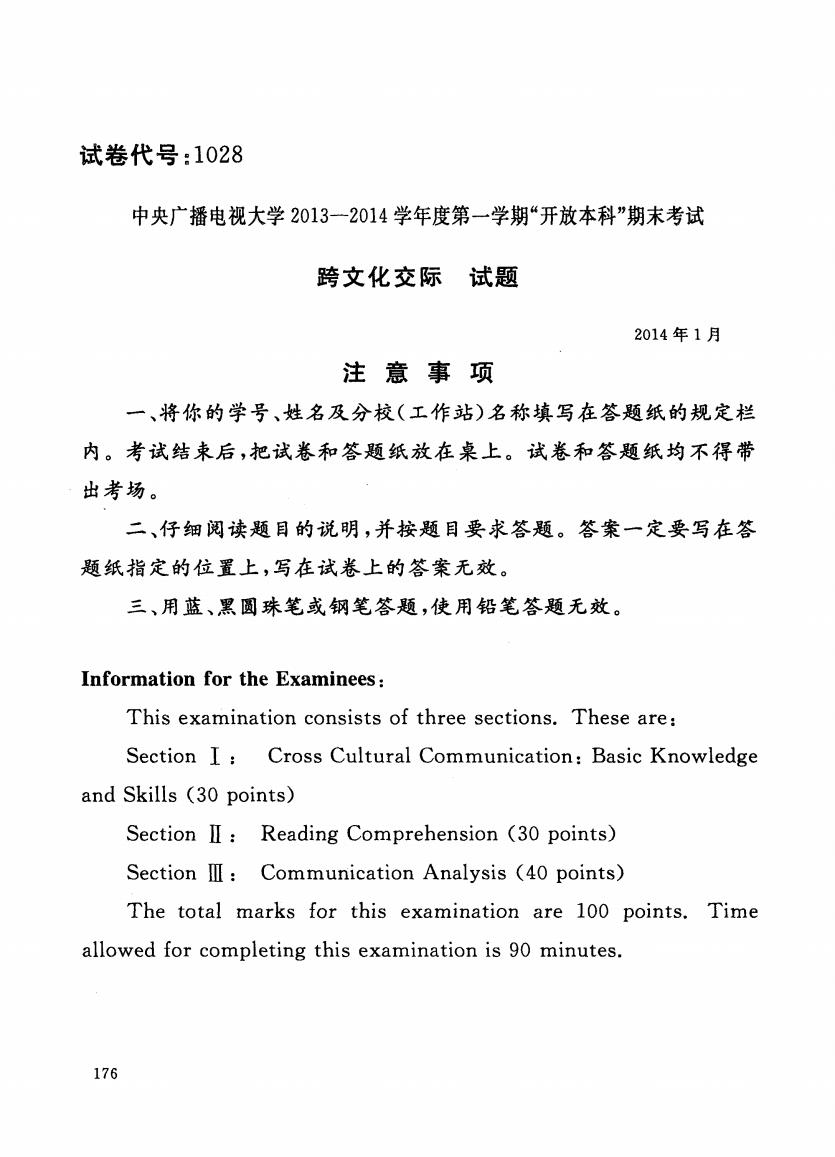
试卷代号:1028 中央广播电视大学2013一2014学年度第一学期“开放本科”期末考试 跨文化交际试题 2014年1月 注意事项 一、将你的学号、姓名及分校(工作站)名称填写在答题纸的规定栏 内。考试结束后,把试卷和答题纸放在桌上。试卷和答题纸均不得带 出考场。 二、仔细阅读题目的说明,并按题目要求答题。答案一定要写在答 题纸指定的位置上,写在试卷上的答案无效。 三、用蓝、黑圆珠笔或钢笔答题,使用铅笔答题无效。 Information for the Examinees: This examination consists of three sections.These are: Section I Cross Cultural Communication:Basic Knowledge and Skills (30 points) Section II:Reading Comprehension (30 points) Section IlI:Communication Analysis (40 points) The total marks for this examination are 100 points.Time allowed for completing this examination is 90 minutes. 176
试卷代号 中央广播电视大学 3一 4学年度第一学期"开放本科"期末考试 跨文化交际试题 2014 年1 注意事项 一、将你的学号、姓名及分校(工作站)名称填写在答题纸的规定栏 内。考试结束后,把试卷和答题纸放在桌上。试卷和答题纸均不得带 出考场。 二、仔细阅读题目的说明,并按题目要求答题。答案一定要写在答 题纸指定的位置上,写在试卷上的答案无效。 三、用蓝、黑圆珠笔或钢笔答题,使用铅笔答题无效。 Information for the Examinees: This examination consists of three sections. These are: Section I: Cross Cultural Communication: Basic Knowledge and Skills (30 points) Section II: Reading Comprehension (30 points) Section III: Communication Analysis (40 points) The total marks for this examination are 100 points. Time allowed for completing this examination is 90 minutes. 176
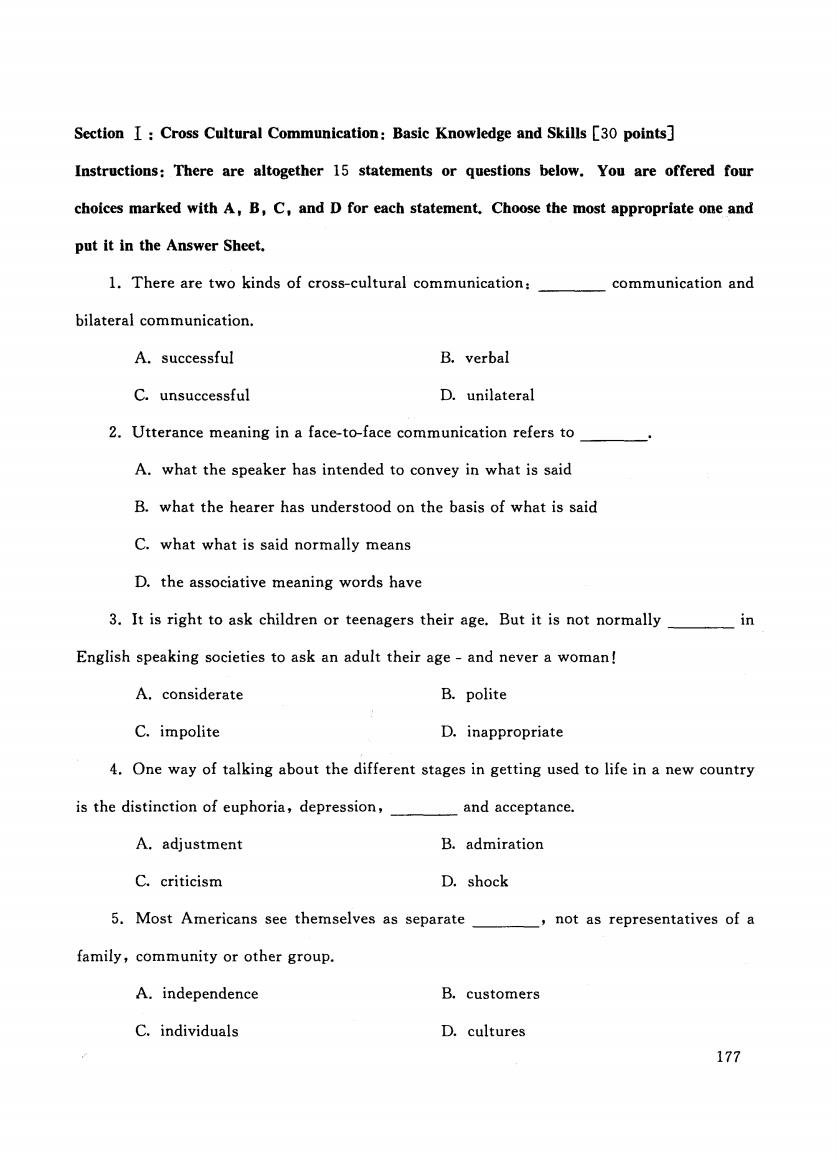
Section I Cross Cultural Communication:Basic Knowledge and Skills [30 points] Instructions:There are altogether 15 statements or questions below.You are offered four choices marked with A,B,C,and D for each statement.Choose the most appropriate one and put it in the Answer Sheet. 1.There are two kinds of cross-cultural communication: communication and bilateral communication. A.successful B.verbal C.unsuccessful D.unilateral 2.Utterance meaning in a face-to-face communication refers to A.what the speaker has intended to convey in what is said B.what the hearer has understood on the basis of what is said C.what what is said normally means D.the associative meaning words have 3.It is right to ask children or teenagers their age.But it is not normally in English speaking societies to ask an adult their age-and never a woman! A.considerate B.polite C.impolite D.inappropriate 4.One way of talking about the different stages in getting used to life in a new country is the distinction of euphoria,depression, and acceptance. A.adjustment B.admiration C.criticism D.shock 5.Most Americans see themselves as separate not as representatives of a family,community or other group. A.independence B.customers C.individuals D.cultures 177
Section I : Cross Cultural Communication: Basic Knowledge and Skills [30 points] Instructions: There are altogether 15 statements or questions below. You are offered four choices marked with A , B, C , and D for each statement. Choose the most appropriate one and put it in the Answer Sheet. 1. There are two kinds of cross-cultural communication: bilateral communication. communication and A. successful C. unsuccessful B. verbal D. unilateral 2. Utterance meaning in a face-to-face communication refers to A. what the speaker has intended to convey in what is said B. what the hearer has understood on the basis of what is said C. what what is said normally means D. the associative meaning words have 3. It is right to ask children or teenagers their age. But it is not normally in English speaking societies to ask an adult their age - and never a woman! A. considerate C. impolite B. polite D. inappropriate 4. One way of talking about the different stages in getting used to life in a new country is the distinction of euphoria , depression , A. adjustment C. criticism and acceptance. B. admiration D. shock 5. Most Americans see themselves as separate family , community or other group. , not as representatives of a A. independence C. individuals B. customers D. cultures 177
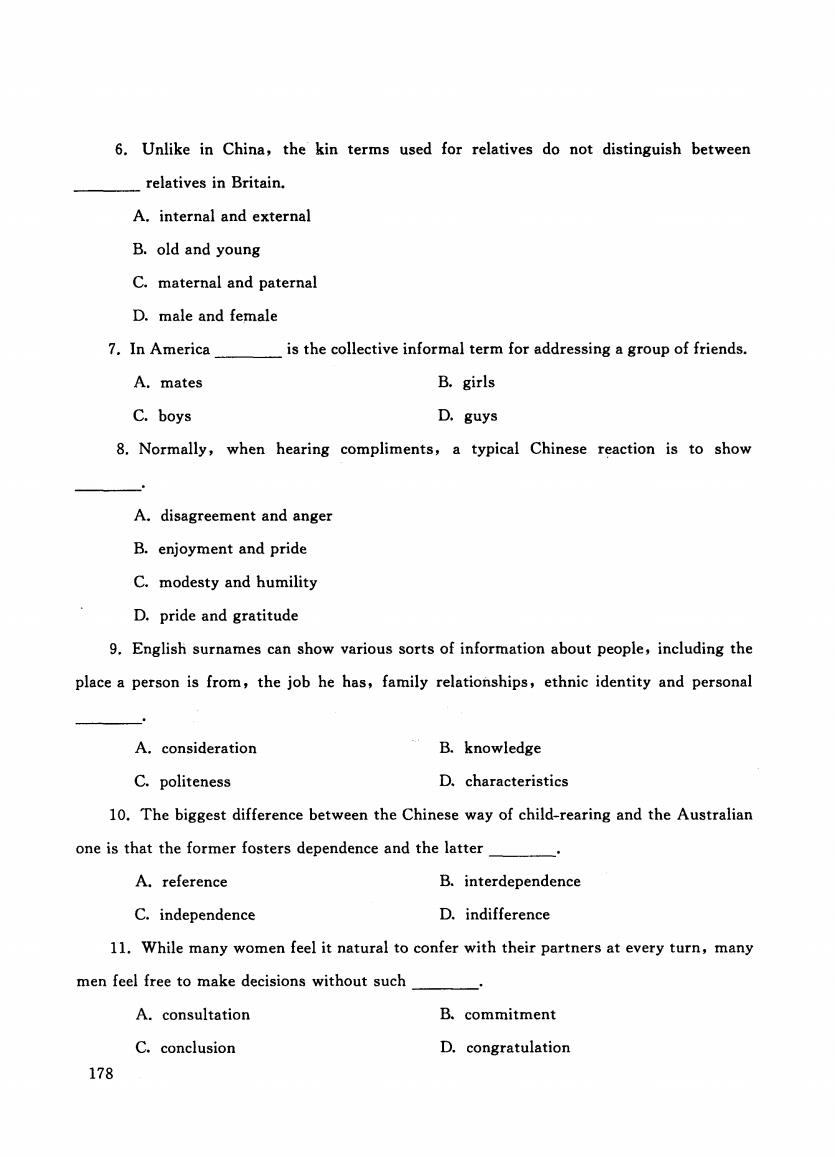
6.Unlike in China,the kin terms used for relatives do not distinguish between _relatives in Britain. A.internal and external B.old and young C.maternal and paternal D.male and female 7.In America is the collective informal term for addressing a group of friends. A.mates B.girls C.boys D.guys 8.Normally,when hearing compliments,a typical Chinese reaction is to show A.disagreement and anger B.enjoyment and pride C.modesty and humility D.pride and gratitude 9.English surnames can show various sorts of information about people,including the place a person is from,the job he has,family relationships,ethnic identity and personal A.consideration B.knowledge C.politeness D.characteristics 10.The biggest difference between the Chinese way of child-rearing and the Australian one is that the former fosters dependence and the latter A.reference B.interdependence C.independence D.indifference 11.While many women feel it natural to confer with their partners at every turn,many men feel free to make decisions without such A.consultation B.commitment C.conclusion D.congratulation 178
6. Unlike in China, the kin terms used for relatives do not distinguish between relatives in Britain. A. internal and external B. old and young C. maternal and paternal D. male and female 7. In America A. mates C. boys is the collective informal term for addressing a group of friends. B. girls D. guys 8. Normally , when hearing compliments, a typical Chinese reaction is to show A. disagreement and anger B. enjoyment and pride C. modesty and humility D. pride and gratitude 9. English surnames can show various sorts of information about people , including the place a person is from , the job he has, family relationships, ethnic identity and personal A. consideration B. knowledge C. politeness D. characteristics 10. The biggest difference between the Chinese way of child-rearing and the Australian one is that the former fosters dependence and the latter A. reference B. interdependence C. independence D. indifference 11. While many women feel it natural to confer with their partners at every turn , many men feel free to make decisions without such 178 A. consultation C. conclusion B. commitment D. congratulation
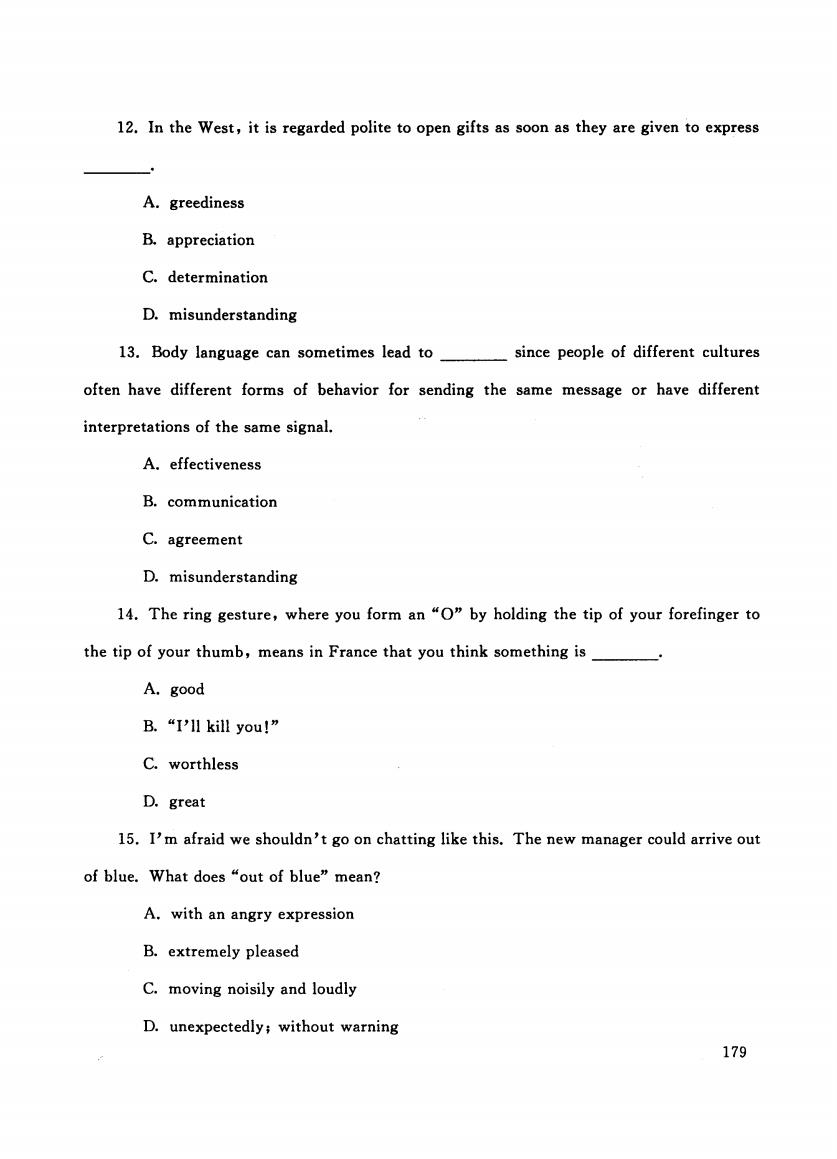
12.In the West,it is regarded polite to open gifts as soon as they are given to express A.greediness B.appreciation C.determination D.misunderstanding 13.Body language can sometimes lead to since people of different cultures often have different forms of behavior for sending the same message or have different interpretations of the same signal. A.effectiveness B.communication C.agreement D.misunderstanding 14.The ring gesture,where you form an "O"by holding the tip of your forefinger to the tip of your thumb,means in France that you think something is A.good B.“I'll kill you!” C.worthless D.great 15.I'm afraid we shouldn't go on chatting like this.The new manager could arrive out of blue.What does“out of blue'”mean? A.with an angry expression B.extremely pleased C.moving noisily and loudly D.unexpectedly;without warning 179
12. In the West , it is regarded polite to open gifts as soon as they are given to express A. greediness B. appreciation C. determination D. misunderstanding 13. Body language can sometimes lead to since people of different cultures often have different forms of behavior for sending the same message or have different interpretations of the same signal. A. effectiveness B. communication C. agreement D. misunderstanding 14. The ring gesture , where you form an "0" by holding the tip of your forefinger to the tip of your thumb , means in France that you think something is A. good B. "I'll kill you!" C. worthless D. great 15. I'm afraid we shouldn't go on chatting like this. The new manager could arrive out of blue. What does "out of blue" mean? A. with an angry expression B. extremely pleased C. moving noisily and loudly D. unexpectedly; without warning 179
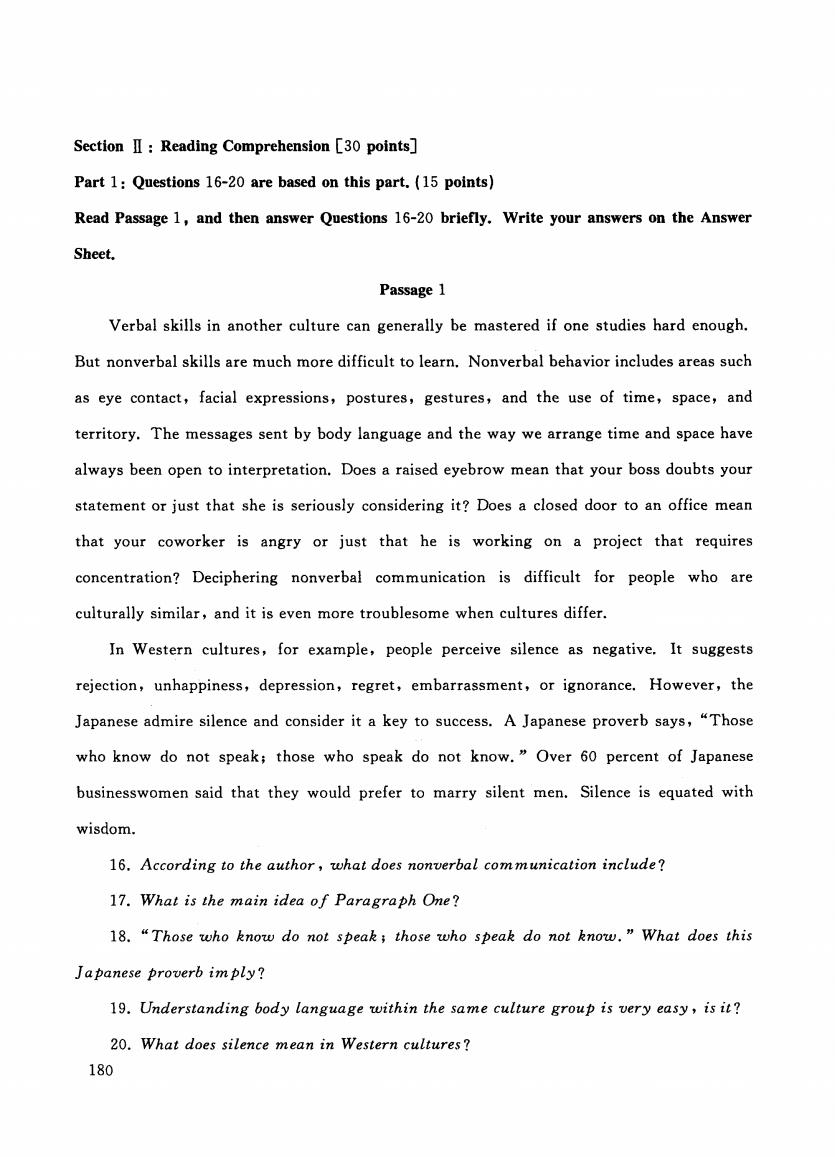
Section II:Reading Comprehension [30 points] Part 1:Questions 16-20 are based on this part.(15 points) Read Passage 1,and then answer Questions 16-20 briefly.Write your answers on the Answer Sheet. Passage 1 Verbal skills in another culture can generally be mastered if one studies hard enough. But nonverbal skills are much more difficult to learn.Nonverbal behavior includes areas such as eye contact,facial expressions,postures,gestures,and the use of time,space,and territory.The messages sent by body language and the way we arrange time and space have always been open to interpretation.Does a raised eyebrow mean that your boss doubts your statement or just that she is seriously considering it?Does a closed door to an office mean that your coworker is angry or just that he is working on a project that requires concentration?Deciphering nonverbal communication is difficult for people who are culturally similar,and it is even more troublesome when cultures differ. In Western cultures,for example,people perceive silence as negative.It suggests rejection,unhappiness,depression,regret,embarrassment,or ignorance.However,the Japanese admire silence and consider it a key to success.A Japanese proverb says,"Those who know do not speak;those who speak do not know.Over 60 percent of Japanese businesswomen said that they would prefer to marry silent men.Silence is equated with wisdom. 16.According to the author,what does nonverbal communication include? 17.What is the main idea of Paragraph One? 18."Those who know do not speak;those who speak do not know.What does this Japanese proverb imply? 19.Understanding body language within the same culture group is very easy,is it? 20.What does silence mean in Western cultures? 180
Section IT : Reading Comprehension [30 points] Part 1: Questions 16-20 are based on this part. (15 points) Read Passage 1 , and then answer Questions 16-20 briefly. Write your answers on the Answer Sh Passage 1 Verbal skills in another culture can generally be mastered if one studies hard enough. But nonverbal skills are much more difficult to learn. Nonverbal behavior includes areas such as eye contact , facial expressions, postures, gestures, and the use of time , space , and territory. The messages sent by body language and the way we arrange time and space have always been open to interpretation. Does a raised eyebrow mean that your boss doubts your statement or just that she is seriously considering it? Does a closed door to an office mean that your coworker is angry or just that he is working on a project that requires concentration? Deciphering nonverbal communication is difficult for people who are culturally similar , and it is even more troublesome when cultures differ. In Western cultures, for example , people perceive silence as negative. It suggests rejection , unhappiness, depression , regret , embarrassment , or ignorance. However, the Japanese admire silence and consider it a key to success. A Japanese proverb says, "Those who know do not speak; those who speak do not know." Over 60 percent of Japanese businesswomen said that they would prefer to marry silent men. Silence is equated with wisdom. 16. According to the author , what does nonverbal communication include? 17. What is the main idea of Paragraph One? 18. "Those who know do not those who speak do not know. " What does this Japanese proverb imply? 19. Understanding body language within the same culture group is very easy , is it? 20. What does silence mean in Western cultures? 180
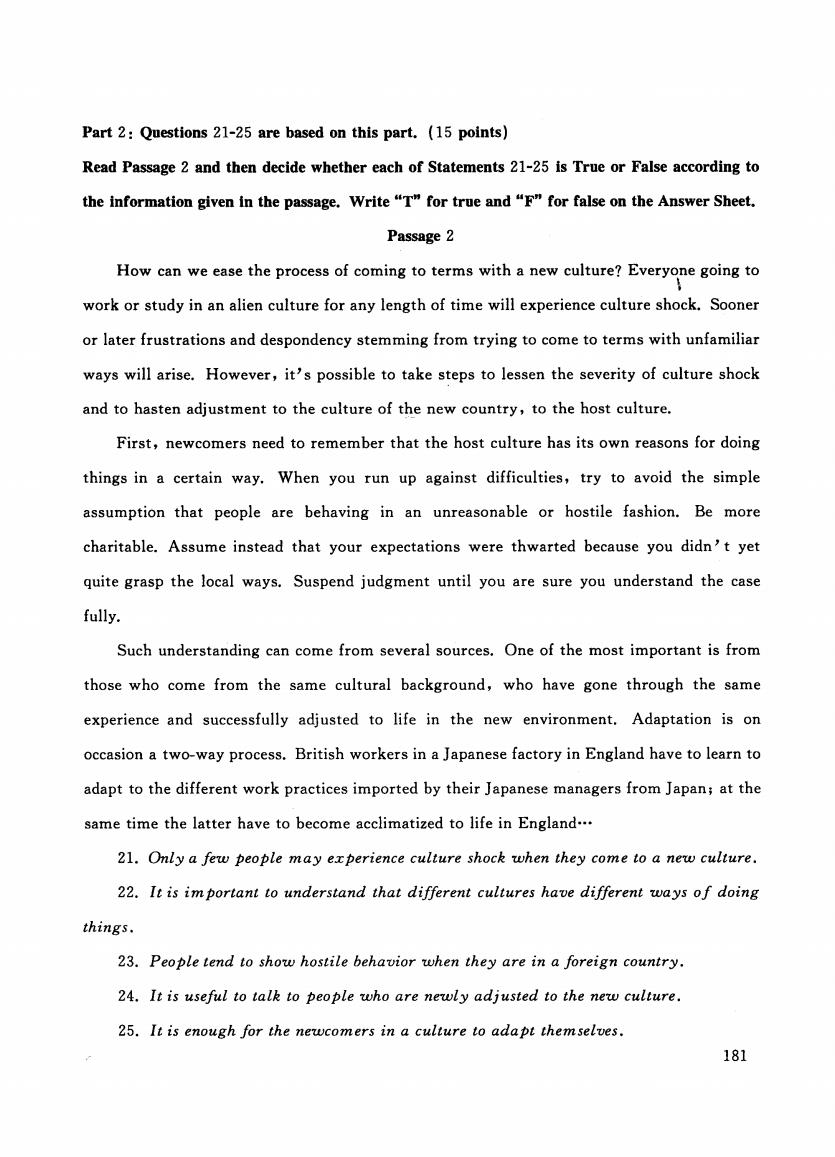
Part 2:Questions 21-25 are based on this part.(15 points) Read Passage 2 and then decide whether each of Statements 21-25 is True or False according to the information given in the passage.Write"T"for true and "F"for false on the Answer Sheet. Passage 2 How can we ease the process of coming to terms with a new culture?Everyone going to work or study in an alien culture for any length of time will experience culture shock.Sooner or later frustrations and despondency stemming from trying to come to terms with unfamiliar ways will arise.However,it's possible to take steps to lessen the severity of culture shock and to hasten adjustment to the culture of the new country,to the host culture. First,newcomers need to remember that the host culture has its own reasons for doing things in a certain way.When you run up against difficulties,try to avoid the simple assumption that people are behaving in an unreasonable or hostile fashion.Be more charitable.Assume instead that your expectations were thwarted because you didn't yet quite grasp the local ways.Suspend judgment until you are sure you understand the case fully. Such understanding can come from several sources.One of the most important is from those who come from the same cultural background,who have gone through the same experience and successfully adjusted to life in the new environment.Adaptation is on occasion a two-way process.British workers in a Japanese factory in England have to learn to adapt to the different work practices imported by their Japanese managers from Japan;at the same time the latter have to become acclimatized to life in England... 21.Only a few people may experience culture shock when they come to a new culture. 22.It is important to understand that different cultures have different ways of doing things. 23.People tend to show hostile behavior when they are in a foreign country. 24.It is useful to talk to people who are newly adjusted to the new culture. 25.It is enough for the newcomers in a culture to adapt themselves. 181
Part 2: Qu四tions 21-25 are based on this part. (15 points) Read Passage 2 and then decide whether each of Statements 21-25 is True or False according to the information given in the passage. Write "T" for true and "F" for false on the Answer Sheet. Passage 2 How can we ease th叫roc臼es臼s of ∞om口mn work or study in an alien culture for any length of time will experience culture shock. Sooner or later frustrations and despondency stemming from trying to come to terms with unfamiliar ways will arise. However, it's possible to take steps to lessen the severity of culture shock and to hasten adjustment to the culture of the new country , to the host culture. First, newcomers need to remember that the host culture has its own reasons for doing things in a certain way. When you run up against difficulties, try to avoid the simple assumption that people are behaving in an unreasonable or hostile fashion. Be more charitable. Assume instead that your expectations were thwarted because you didn' t yet quite grasp the local ways. Suspend judgment until you are sure you understand the case fully. Such understanding can come from several sources. One of the most important is from those who come from the same cultural background , who have gone through the same experience and successfully adjusted to life in the new environment. Adaptation is on occasion a two-way process. British workers in a Japanese factory in England have to learn to adapt to the different work practices imported by their Japanese managers from Japan; at the same time the latter have to become acclimatized to life in England'" 21. Only a few people may exρerience culture shock when they come to a new culture. 22. It is important to understand that different cultures have different ways of doing things. 23. People tend to show hostile behavior when they are in a foreign country. 24. It is useful to talk to peoρle who are newly adjusted to the new culture. 25. It is enough for the newcomers in a culture to adapt themselves. 181

Section II:Communication Analysis [40 points] Instructions:The following are three different cases of cross-cultural communication.In each of the cases there is something to be improved upon.Write an analysis on what is to be desired for more successful communication or cultural understanding in each case by answering Questions 26-28 respectively.Your analysis of each case should be about 100-150 words.Write your answers on the Answer Sheet. Note!Your writing ability will also be assessed in this section of the test. Case 1 (10 points) When Zhang Tao traveled in America,he lived in the home of his American friend,Bill. Once after he had traveled back,he found Bill was in a bad mood.When he asked what the problem was,Bill told Zhang Tao that his son Adam got furious about the noise Zhang made when walking upstairs and also because he was using too much water in the solar powered shower and Adam had to have his shower in cold water.Bill told Zhang Tao that he should walk more softly in future,and have a fast shower to save water.Zhang Tao felt uneasy. How could the host set such rules for his guest?! Question 26: Why did Zhang Tao feel uneasy? Case 2 (15 points) Lin had traveled 20 hours from Beijing to New York.He needed a good meal.His American friend,Mike,met him.But Mike only offered him a plate of roasted chicken and a glass of orange juice.Lin was used to having a main course,and asked Mike if he had any rice.Mike said he only had fried noodles,and Lin had to make do with it.Though Lin knew Americans didn't care very much about what food they ate,he still felt surprised because he had taken Mike to the most famous duck restaurant in Beijing-Quanjude-when he arrived in Beijing. 182
Section Communication Analysis [40 points] Instructions: The following are three different cas 。f cr s-cultural communication. In each of the cases there is something to be improved upon. Write an analysis on what is to be desired for more successful communication or cultural understanding in 囚e by answering Questions 26-28 respectively. Your analysis of each case should be about 100-150 words. Write your answers on the Answer Sheet. Note! Your writing ability will also be assessed in this section of the test. Case 1 (10 points) When Zhang Tao traveled in America , he lived in the home of his American friend , Bill. Once after he had traveled back , he found Bill was in a bad mood. When he asked what the problem was, Bill told Zhang Tao that his son Adam got furious about the noise Zhang made when walking upstairs and also because he was using too much water in the solar powered shower and Adam had to have his shower in cold water. Bill told Zhang Tao that he should walk more softly in future , and have a fast shower to save water. Zhang Tao felt uneasy. How could the host set such rules for his guest?! Question 26: Why did Zhang Tao feel uneasy? Case 2 (15 points) Lin had traveled 20 hours from Beijing to New York. He needed a good mea l. His American friend , Mike , met him. But Mike only offered him a plate of roasted chicken and a glass of orange juice. Lin was used to having a main course , and asked Mike if he had any rice. Mike said he only had fried noodles, and Lin had to make do with it. Though Lin knew Americans didn't care very much about what food they ate , he still felt surprised because he had taken Mike to the most famous duck restaurant in Beijing-Quanjude - when he arrived in Beijing. 182
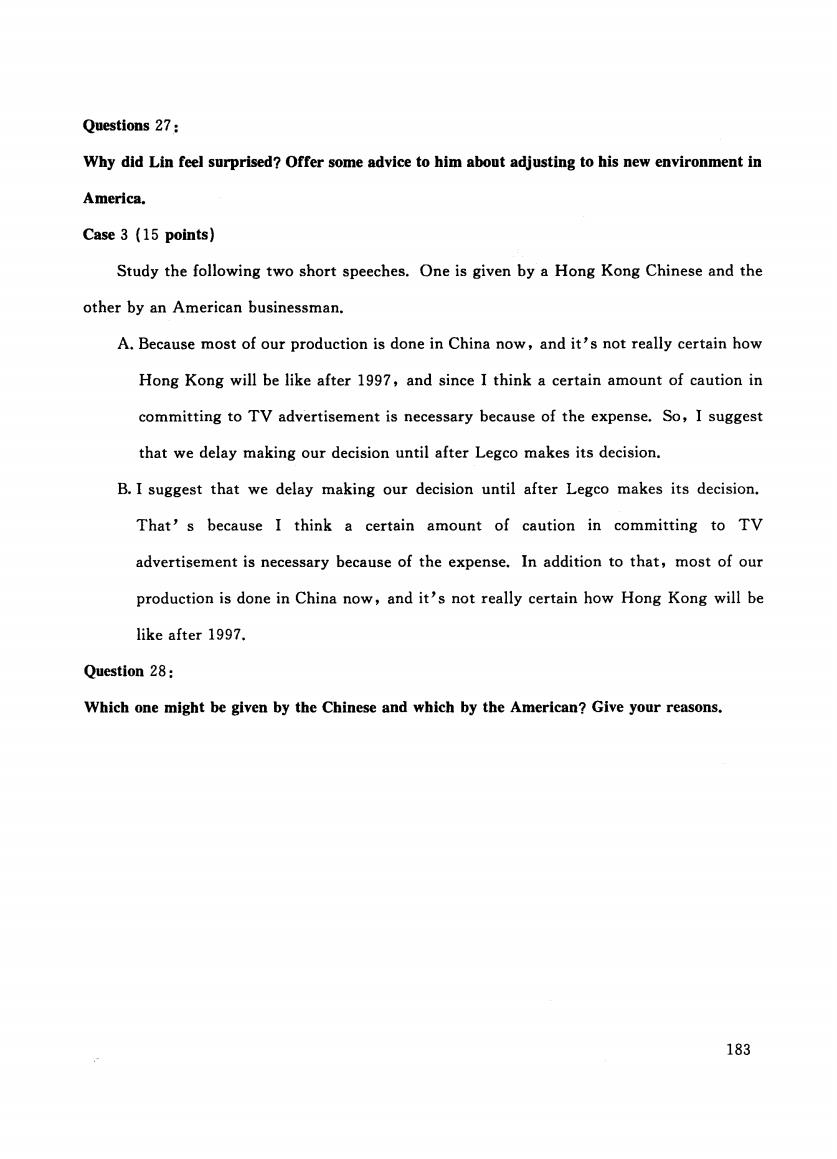
Questions 27: Why did Lin feel surprised?Offer some advice to him about adjusting to his new environment in America. Case 3 (15 points) Study the following two short speeches.One is given by a Hong Kong Chinese and the other by an American businessman. A.Because most of our production is done in China now,and it's not really certain how Hong Kong will be like after 1997,and since I think a certain amount of caution in committing to TV advertisement is necessary because of the expense.So,I suggest that we delay making our decision until after Legco makes its decision. B.I suggest that we delay making our decision until after Legco makes its decision. That's because I think a certain amount of caution in committing to TV advertisement is necessary because of the expense.In addition to that,most of our production is done in China now,and it's not really certain how Hong Kong will be like after 1997. Question 28: Which one might be given by the Chinese and which by the American?Give your reasons. 183
Questions 27: Why did Lin feel surprised? Offer some advice to him about adjusting to his new environment in America. Case 3 (15 points) Study the following two short speeches. One is given by a Hong Kong Chinese and the other by an American businessman. A. Because most of our production is done in China now , and it's not really certain how Hong Kong will be like after 1997 , and since I think a certain amount of caution in committing to TV advertisement is necessary because of the expense. So , I suggest that we delay making our decision until after Legco makes its decision. B. I suggest that we delay making our decision until after Legco makes its decision. That' s because I think a certain amount of caution in committing to TV advertisement is necessary because of the expense. In addition to that , most of our production is done in China now , and it's not really certain how Hong Kong will be like after 1997. Question 28: Which one might be given by the Chinese and which by the American? Give your reasons. 183

试卷代号:1028 座位号■■ 中央广播电视大学2013一2014学年度第一学期“开放本科”期末考试 跨文化交际 试题答题纸 2014年1月 题号 Section I Section II SectionⅢ 总分 分数 得分 评卷人 Section I:Cross Cultural Communication:Basic Knowledge and Skills [30 points] (30 points,2 points each) 1. 2. 3. 4. 5. 6. 7. 8. 9. 10. 11. 12. 13. 14. 15. 得 分 评卷人 SectionⅡ:Reading Comprehension[30 points] Part 1.(15 points,3 points each.0.5 point off for each grammar/spelling mistake,but at most 1 point can be deducted for each item for the grammar/spelling mistakes.The exact wording is not required,but the meaning must be the same 16. 17. 18. 19. 20. 184
试卷代号 座位号OJ 中央广播电视大学 2 0 4学年度第一学期"开放本科"期末考试 跨文化交际试题答题纸 2014 年1 Section I Section IT Section ill |得分|评卷人| I I I Section I: Cross Cultural Communication: Basic Knowledge and Skills [30 points] 3. 4. 5. 8. 9. 10. 13. 14. 15. (30 points, 2 points each) 1. 2. 6. 7. 11.12. |得分|评卷人| I I ISection IT : Reωadin问ing 咆gCωom叩pr 川oin Part 1. (1 5 points, 3 points each. 0.5 point off for each grammar/spelling mistake , but at most 1 point can be deducted for each item for the grammar/spelling mistakes. The exact wording is not required , but the meaning must be the same ) 16. 17. 18. 19. 20. 184

Part 2.(15 points,3 points each. 21. 22. 23. 24. 25. 得分 评卷人 Section II:Communication Analysis [40 points] Question 26. Case 1 (10 points,7 points for the analysis,3 points for overall language quality) Question 27. Case 2(15 points,10 points for the analysis,5 points for overall language quality) Question 28. Case 3(15 points,10 points for the analysis,5 points for overall language guality) 185
Part 2. (1 5 points, 3 points each. ) 21. 22. 23. 24. 25. |得分|评卷人| I I I Section Communication Analysis [40 points] Question 26. Case 1 (1 0 points, 7 points for the analysis, 3 points for overalllanguage quality) Question 27. Case 2 (1 5 points, 10 points for the analysis, 5 points for overall language quality) Question 28. Case 3 (1 5 points, 10 points for the analysis, 5 points for overalllanguage quality) 185